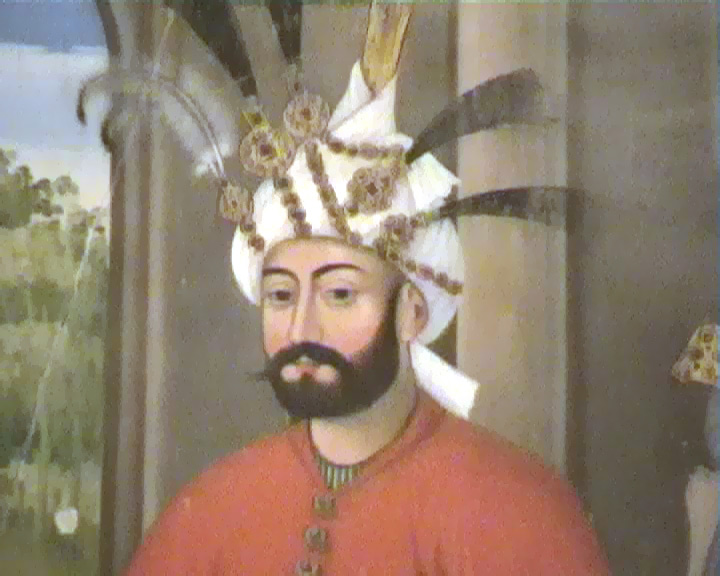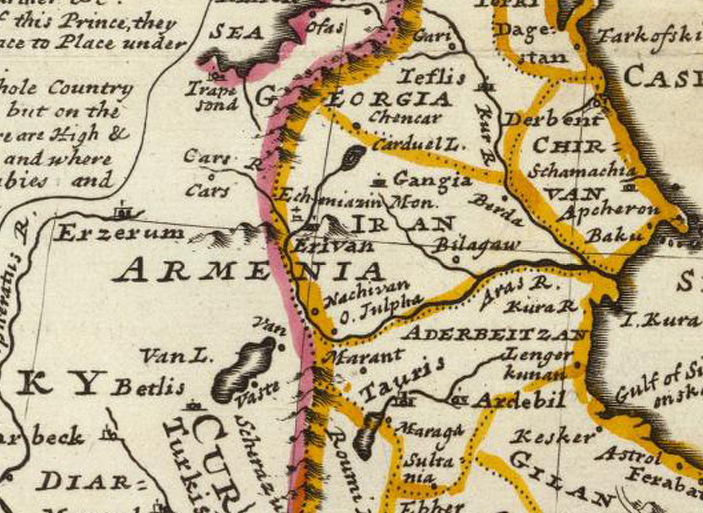Tokhmaq Khan Ustajlu on:
[Wikipedia]
[Google]
[Amazon]
Mohammad Khan Tokhmaq Ustajlu ( fa, محمد خان تخماق استاجلو, translit=Mohammad Xān Toxmāq Ostājlu), also commonly known as Tokhmaq Khan Ustajlu ( fa, تخماق خان استاجلو, links=no), was a 16th-century

 Mohammad Khan Tokhmaq was the son of the previous governor of Erivan Province, Shahqoli Soltan Ustajlu, and was thus a member of the Turkoman Ustajlu tribe. The Erivan Province was centered on present-day
Mohammad Khan Tokhmaq was the son of the previous governor of Erivan Province, Shahqoli Soltan Ustajlu, and was thus a member of the Turkoman Ustajlu tribe. The Erivan Province was centered on present-day
Iranian
Iranian may refer to:
* Iran, a sovereign state
* Iranian peoples, the speakers of the Iranian languages. The term Iranic peoples is also used for this term to distinguish the pan ethnic term from Iranian, used for the people of Iran
* Iranian lan ...
official, diplomat and military leader from the Turkoman Ustajlu tribe. He was appointed as governor (''beglarbeg'') of Erivan Province (also known as Chokhur-e Sa'd) in 1568–1575. Thereafter, he led an embassy to the Ottoman Empire
The Ottoman Empire, * ; is an archaic version. The definite article forms and were synonymous * and el, Оθωμανική Αυτοκρατορία, Othōmanikē Avtokratoria, label=none * info page on book at Martin Luther University) ...
. On his return, he participated in some judicial developments, and was reappointed as governor of Erivan Province in 1578. In the same year, he served as main commander at the Battle of Çıldır during the Ottoman–Safavid War of 1578–1590, where his army was routed. A few years later, in 1583, Mohammad Khan Tokhmaq's second tenure over the Erivan Province was brought to an end due to encroachments by the Ottomans, who controlled the province until 1604.
Biography
Embassy to the Ottomans

 Mohammad Khan Tokhmaq was the son of the previous governor of Erivan Province, Shahqoli Soltan Ustajlu, and was thus a member of the Turkoman Ustajlu tribe. The Erivan Province was centered on present-day
Mohammad Khan Tokhmaq was the son of the previous governor of Erivan Province, Shahqoli Soltan Ustajlu, and was thus a member of the Turkoman Ustajlu tribe. The Erivan Province was centered on present-day Armenia
Armenia (), , group=pron officially the Republic of Armenia,, is a landlocked country in the Armenian Highlands of Western Asia.The UNbr>classification of world regions places Armenia in Western Asia; the CIA World Factbook , , and ' ...
, its provincial capital being Erivan (Yerevan
Yerevan ( , , hy, Երևան , sometimes spelled Erevan) is the capital and largest city of Armenia and one of the world's oldest continuously inhabited cities. Situated along the Hrazdan River, Yerevan is the administrative, cultural, and i ...
). In 1568, Shah
Shah (; fa, شاه, , ) is a royal title that was historically used by the leading figures of Iranian monarchies.Yarshater, EhsaPersia or Iran, Persian or Farsi, ''Iranian Studies'', vol. XXII no. 1 (1989) It was also used by a variety of ...
("King") Tahmasp I
Tahmasp I ( fa, طهماسب, translit=Ṭahmāsb or ; 22 February 1514 – 14 May 1576) was the second shah of Safavid Iran from 1524 to 1576. He was the eldest son of Ismail I and his principal consort, Tajlu Khanum. Ascending the throne after ...
(1524-1576) appointed him as his father's successor. Several years later, shortly before his death, Tahmasp I sent Mohammad Khan Tokhmaq as an ambassador to the neighboring Ottoman Empire
The Ottoman Empire, * ; is an archaic version. The definite article forms and were synonymous * and el, Оθωμανική Αυτοκρατορία, Othōmanikē Avtokratoria, label=none * info page on book at Martin Luther University) ...
to congratulate Murad III on his accession to the Ottoman throne. Tahmasp I wished to maintain the cordial relations that were initiated by the Peace of Amasya
The Peace of Amasya ( fa, پیمان آماسیه ("Peymān-e Amasiyeh"); tr, Amasya Antlaşması) was a treaty agreed to on May 29, 1555, between Shah Tahmasp of Safavid Iran and Sultan Suleiman the Magnificent of the Ottoman Empire at the ci ...
in 1555. The embassy, comprising some 250 men and 500 camels, arrived in Scutari, adjacent to the imperial capital, Constantinople
la, Constantinopolis ota, قسطنطينيه
, alternate_name = Byzantion (earlier Greek name), Nova Roma ("New Rome"), Miklagard/Miklagarth (Old Norse), Tsargrad ( Slavic), Qustantiniya ( Arabic), Basileuousa ("Queen of Cities"), Megalopolis ( ...
, in May 1576. They brought numerous costly gifts, including precious manuscripts and stones, as well as weapons and fine rugs. The most costly gift of all was an imperial tent decorated with jewels.
A grand reception
Reception is a noun form of ''receiving'', or ''to receive'' something, such as art, experience, information, people, products, or vehicles. It may refer to:
Astrology
* Reception (astrology), when a planet is located in a sign ruled by another ...
followed, and the envoys were sent back with two luxuriously harnessed horses as well as 5,000 ducats. Both the ceremony and the construction of the tent are depicted in the first volume of the ''Shahanshah-nameh'' (dated 1581). The tent, considered to be a "magnificent piece of art" according to Zeren Tanındı, has not survived. Tahmasp I's letter of greeting, which Mohammad Khan Tokhmaq presented to Murad III, is in the archives of the Topkapı Palace
The Topkapı Palace ( tr, Topkapı Sarayı; ota, طوپقپو سرايى, ṭopḳapu sarāyı, lit=cannon gate palace), or the Seraglio, is a large museum in the east of the Fatih district of Istanbul in Turkey. From the 1460s to the complet ...
.
Judicial participation
During the short reign of ShahIsmail II
Ismail II (; Born Ismail Mirza; 31 May 1537 – 24 November 1577) was the third Shah of Safavid Iran from 1576 to 1577. He was the second son of Tahmasp I with his principal consort, Sultanum Begum. By the orders of Tahmasp, Ismail spent twent ...
(1576–1577), the Shah ordered Mohammad Khan Tokhmaq, Grand Vizier Mirza Shokrollah Isfahani Mirza Shokr Allah Isfahani ( fa, میرزا شکرالله اصفهانی) was a Persian statesman, who served as the chief accountant of the Safavid shah Tahmasp I (r. 1524–1576), and later as the grand vizier of shah Ismail II (r. 1576–77) b ...
, and Mirza Ali Qajar to function as members of the ''orf'' court within the court of justice, in order to assist the incumbent '' divanbegi'' (chancellor, chief justice) Soltan Ebrahim Mirza, in giving judgement on individual cases involving finance as well as matters affecting the interests of the state in general. The mandates and judgements proposed by Mohammad Khan Tokhmaq and the others were eventually endorsed by the "supreme ''divan''", with Ismail II's approval, and for a few months, they were put to practise.
War
In 1578, ShahMohammad Khodabanda
Mohammad Khodabanda (also spelled Khodabandeh; fa, شاه محمد خدابنده, born 1532; died 1595 or 1596), was the fourth Safavid shah of Iran from 1578 until his overthrow in 1587 by his son Abbas I. Khodabanda had succeeded his brothe ...
(1578–1587) reappointed Mohammad Khan Tokhmaq as governor of Erivan Province. During the prelude to the Ottoman–Safavid of 1578–1590 the Safavids were well informed about the coming Ottoman assault but not about its magnitude. Mohammad Khan Tokhmaq was ordered by the Shah to recruit troops from all over northwestern Iran. Having assembled an army of some 15,000–30,000 men, he marched to the vicinity of Çıldır
Çıldır ( hy, Հիւսիսեան, Husenian; meaning "North"; ka, ჩრდილი, Chrdili; meaning "Shadow") is a district of Ardahan Province of Turkey
Turkey ( tr, Türkiye ), officially the Republic of Türkiye ( tr, Türkiye Cu ...
, not far from the Ottoman army, which was commanded by Lala Mustafa Pasha
Lala Mustafa Pasha ( – 7 August 1580), also known by the additional epithet ''Kara'', was an Ottoman Bosnian general and Grand Vizier from the Sanjak of Bosnia.
Life
He was born around 1500, near the Glasinac in Sokolac Plateau in Bosnia t ...
. The modern historian Rudi Matthee
Rudolph P. Matthee, best known as Rudi Matthee (born 1953), is John and Dorothy Munroe Distinguished Professor of History in the History Department at the University of Delaware, teaching Middle Eastern history and specializing in the history of ea ...
states that his spies miscalculated the size of the Ottoman army, "only counting the ones that were visible to them". According to Iskandar Beg Munshi
Iskandar Beg Munshi ( fa, اسکندربیگ منشی), a.k.a. Iskandar Beg Turkman () ( – c. 1632), was a Persian historian of Turkoman origin of the Safavid emperor Shah Abbas I. Iskandar Beg began as an accountant in the bureaucracy, but ...
(died ) and Juan Tomas Minadoi (died 1615), Mohammad Khan Tokhmaq, "emboldened" by the news from his spies, decided to attack. Munshi put the blame on the Qizilbash
Qizilbash or Kizilbash ( az, Qızılbaş; ota, قزيل باش; fa, قزلباش, Qezelbāš; tr, Kızılbaş, lit=Red head ) were a diverse array of mainly Turkoman Shia militant groups that flourished in Iranian Azerbaijan, Anatolia, t ...
, stating that they ruined "their potential strength through disunity and internal bickering and of foolhardily rushing into war, taking on an army of 100,000 with a mere 15,000 troops rather than waiting until all reinforcements had arrived".
On 9 August, Mohammad Khan Tokhmaq and his men engaged the Ottomans. Heavily outnumbered, the Safavid forces were defeated, and some 5,000-7,000 were slain on the battlefield, while another 3,000 were taken captive and beheaded. Mohammad Khan Tokhmaq's second tenure over the Erivan Province was brought to an end in 1583 due to Ottoman encroachment, which resulted in an Ottoman takeover of the province until 1604.
A ''gholam
Ghulam ( ar, غلام, ) is an Arabic word meaning ''servant'', ''assistant'', ''boy'', or ''youth''. It is used to describe young servants in paradise. It is also used to refer to slave-soldiers in the Abbasid, Ottoman, Safavid and to a lesse ...
'' (slave-soldier) of Mohammad Khan Tokhmaq, Behbud Agha, was a Georgian
Georgian may refer to:
Common meanings
* Anything related to, or originating from Georgia (country)
** Georgians, an indigenous Caucasian ethnic group
** Georgian language, a Kartvelian language spoken by Georgians
**Georgian scripts, three scrip ...
who hailed from a Kartli
Kartli ( ka, ქართლი ) is a historical region in central-to-eastern Georgia traversed by the river Mtkvari (Kura), on which Georgia's capital, Tbilisi, is situated. Known to the Classical authors as Iberia, Kartli played a crucial rol ...
an noble family (''tavadi
''Tavadi'' ( ka, თავადი, "prince", lit. "head/chief" an from ka, თავი ''tavi'', "head", with the prefix of agent ''-di'') was a feudal title in Georgia first applied in the Late Middle Ages usually translated in English as P ...
''). He converted to Islam during his service to Mohammad Khan Tokhmaq. Two of Behbud Agha's sons, Ali-Qoli Beg and Emamqoli Beg, together briefly served as governors of Kartli in the 1610s.
Notes
References
Sources
* * * * * * * {{s-end 16th-century births Iranian Turkmen people Safavid governors of Erivan Safavid generals Safavid diplomats Ustajlu 16th-century people of Safavid Iran Year of death unknown 16th-century diplomats